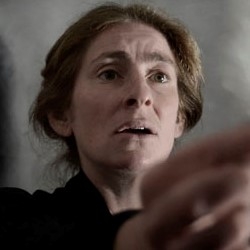Wrong 'Un – A Sufragette's Story (Salford)
Dave Cunningham finds that the play ”Wrong ‘Un” gives an interesting take on a well known story at the Lowry

© Tim Smith
Born in the late 19th Century Lancastrian Annie Wilde (sole performer Ella Harris) is a "Wrong ‘Un". A one-woman awkward squad, she demands the right to play football and wage parity with men. Boff Whalley‘s musical drama suggests that it is Annie’s contrary nature, rather than any political conviction, that draws her to the Suffragette movement.
Filtering the story through Annie’s biography allows Whalley to draw out issues of class-consciousness from the familiar Suffragette story. He suggests that the Belgravia set that led the movement were out of touch with the working class "Clog and Shawl" element. The result was, initially, that votes were secured for "ladies" who owed property leaving the majority of the women who were not so privileged disenfranchised. Whalley details the more misguided actions of the Suffragettes, including handing out White Feathers to show contempt for men who had not joined the army in the First World War.
Despite these original touches, there is a curious lack of passion about the play. The irony that, having stood against authority all her life, Annie is effectively betrayed by the leaders she trusts, is not emphasised. Annie’s sheer bloody-mindedness seems to give her the resilience to continue without bitterness. Aside from Annie the characters in the play are broad caricatures (senile judges, drunken politicians) that are used as comic relief rather than representatives of inequality.
Director Justin Audibert attracts sympathy for Annie by focusing on her vulnerability. The physically slight figure of Harris is isolated against a grim slate grey background. The songs in the play, written in the style of the music hall, give Annie a defiantly cheerful inner monologue. Their performance without musical backing, however, makes the character sound like a lone voice against injustice.
The emotional impact of the play is brought out by a fine performance from Harris. She creates a very human and admirable character – brave enough to challenge authority despite being frightened of the consequences. Harris’s stark description of a brutal prison force-feeding regime is horrifying.
Wrong ‘Un manages to find a fresh aspect to a well-known story but, despite a strong performance, is not as engaging as you would hope.
Wrong 'Un is at the Lowry until 17 January.
– Dave Cunningham












